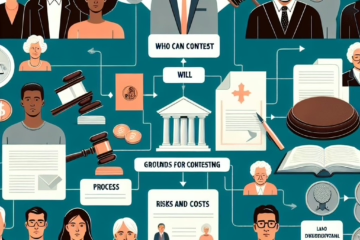In many cases, a person making his or her Will (testator) may choose to divide their estate equally among their heirs. However, in some circumstances, an equal division of an estate may not reflect the realities of family dynamics, caregiving contributions, or financial need. In British Columbia, the Wills, Estates and Succession Act (WESA) provides the framework for dividing estates, but it also allows for exceptions where an equal distribution might be seen as unfair. Through various cases, BC courts have illustrated that the fair distribution of a Will depends on more than just equal shares.
WESA and Equal Distribution
WESA emphasizes the testator’s right to decide how their estate is to be divided. However, if the Will does not adequately provide for certain beneficiaries, it gives courts the authority to make adjustments.
When a Will specifically divides an estate equally among heirs, it is often presumed to reflect the testator’s intentions of fairness. However, this principle of equal distribution can sometimes be challenged, especially in the case of complex family dynamics, caregiving contributions, or disparities in financial need.
WESA provides the court with the power to vary a Will’s provisions if it finds that certain family members have not been adequately provided for. This is particularly relevant in the case of children, spouses, or dependents who may argue that they have not received sufficient provision from the deceased testator. Courts have the discretion to adjust the distribution based on the individual circumstances of the beneficiaries.
Thus, while equal division may initially seem fair, it may not always be appropriate when viewed through the lens of each beneficiary’s contributions, needs, or expectations.
Unfairness in Equal Distribution
Several significant cases have highlighted how an equal division of an estate may be deemed unfair or unjust. Below, we discuss key cases from BC that provide important context and rulings on this issue.
Rawlins v. Rawlins (2023)
In Rawlins v. Rawlins, the court considered the adequacy of provisions made under a mother’s Will and whether one son’s caregiving contributions were sufficiently recognized. The estate, valued at over $2.5 million, was divided equally among three sons. However, Doug Rawlins, who had lived rent-free in the family home for years and served as the primary caregiver for his elderly parents, argued that his contributions were not acknowledged.
Doug’s claim centered around two issues: first, whether the equal distribution in the Will provided adequate provision for him under WESA, and second, whether he had a valid claim for unjust enrichment due to his caregiving role. Doug’s argument was that, although the Will divided the estate equally, his years of care and support for his parents should have been reflected in a larger share of the estate.
The court ultimately concluded that the Will’s equal division did provide adequate provision for Doug and upheld the testamentary intent of his mother. However, the court also recognized Doug’s claim of unjust enrichment based on his caregiving contributions. The court awarded Doug $115,000, which was seen as a remedy for his unjust enrichment claim, given his significant contributions. This case illustrates that while an equal division may reflect the testator’s intent, it may not always fully account for contributions that go beyond mere financial value.
Peterson v. Welwood (2018)
The Peterson v. Welwood case sheds light on the importance of testamentary capacity and the potential for claims of undue influence, even in the absence of an equal distribution. The plaintiff, Calvin Peterson, contested the will of his adopted father, Henry Sherwood Peterson, on the grounds that the deceased lacked testamentary capacity and was unduly influenced by his caregiver. The case explored the complex relationship between the testator and those who might stand to inherit.
Ultimately, the court found that Henry Peterson had the requisite mental capacity when executing his will and that there was no undue influence by the caregiver. The equal distribution in the will was upheld, illustrating that even when claims of undue influence arise, the court will defer to the testator’s intentions as long as there is no clear evidence of manipulation.
This case highlights that while equal distribution can be challenged on grounds of undue influence or incapacity, the legal presumption remains that the testator’s will should be respected, unless compelling evidence suggests otherwise.
Unger v. Unger Estate (2017)
In Unger v. Unger Estate, the court addressed the adequacy of provisions made for a spouse in a will, a principle that can be extended to the context of children. The case involved Lillis Belle Unger, the plaintiff, who argued that her husband Jacob’s will did not provide adequately for her after their 34-year marriage. Jacob’s will left the estate to his four children, excluding Lillis entirely.
The court found that the will did not make adequate provision for Lillis, considering both the legal and moral obligations Jacob had towards her as his spouse. The court varied the will, awarding Lillis 30% of the estate’s residue, while the remaining 70% was divided equally among Jacob’s children. This case illustrates that while a will may divide an estate equally among children, the legal and moral obligations of the testator toward their spouse—or, by analogy, a child—must be considered when determining fairness.
The principle established in this case is important when considering fairness in an equal division. While the will may distribute assets equally, the testator’s obligations to certain beneficiaries may require a modification of that equal distribution.
Conclusion: Is Equal Division Always Fair?
The question of whether an equally divided will can be unfair is a complex one. As illustrated by the cases discussed above, BC courts often recognize that the equal distribution of an estate does not always account for the nuances of family dynamics, caregiving contributions, or financial need. While WESA allows for a testator’s intent to be respected, it also grants the court discretion to adjust the distribution if fairness demands it.
All three cases above demonstrate that equal distribution is not an absolute guarantee of fairness. Courts often take into account factors like caregiving contributions, financial need, and moral obligations when deciding whether to vary the provisions of a will.
In summary, while an equal division of an estate may initially appear fair, it can be challenged in cases where it fails to reflect the true intentions of the testator or the unique contributions and needs of the beneficiaries. BC law provides mechanisms for addressing these concerns, ensuring that fairness in estate distribution extends beyond simple equality.
Discover more from Pax Law Corporation
Subscribe to get the latest posts sent to your email.


